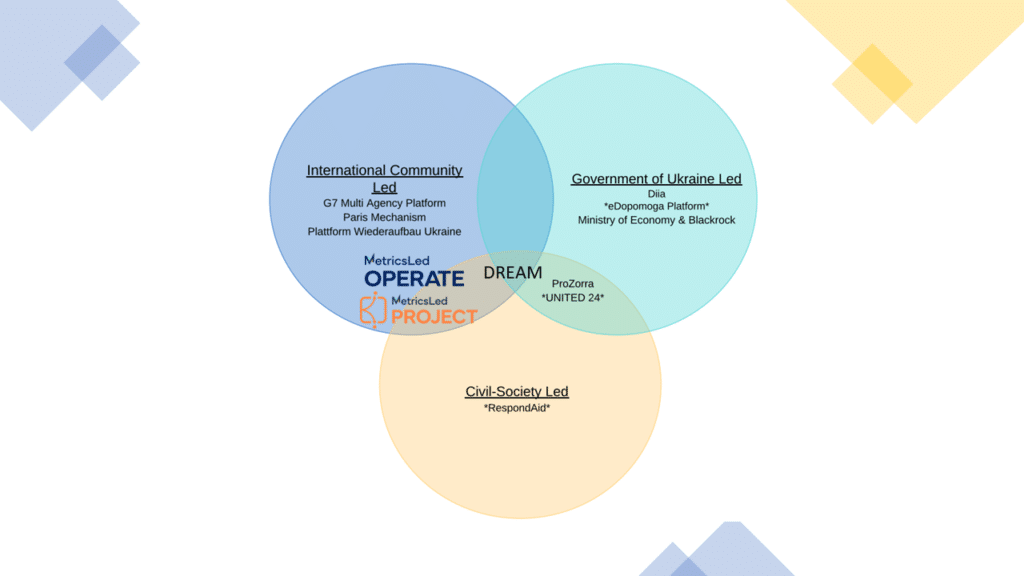Challenges of Digitally Driven Reconstruction: a note for the London Ukraine Recovery Conference
This note is prepared in advance of the London Conference on Ukraine’s Recovery (URC) in June 2023.
The URC has the stated aim of ‘mobilising international support for Ukraine’s recovery, including through emergency assistance for immediate needs and financing private sector participation in the reconstruction process.’[i]
This paper highlights the growing importance of digital platforms in that reconstruction process and their use in providing for emergency and immediate needs.
The paper sets out the challenges of coordinating those platforms, points to action required to boost digital diplomacy and provides an overview and contact details for the main platforms/players.
Metricsled’s own digital delivery platforms are deployed in Ukraine[ii] and support a number of major UK funded programmes of emergency, humanitarian and technical assistance.
Overview
There are a growing number of platforms circling in the Digital Cloud above Ukraine gearing up to support reconstruction: many have overlapping aims and varying degrees of ambition, official status, and public accessibility/oversight.
Ultimately, these platforms are about the flows of money, life-saving supplies and kit into Ukraine, but they can be designed and configured to serve many other purposes:
- Channelling citizen activism and patriotism into reconstruction and reform.
- Meeting public and donor accountability requirements.
- Supporting reforms required for EU accession and track conditions of grants/loans linked to sectors such as public financial management etc. at oblast and sub-oblast levels of government.
- Facilitating involvement of civil society and the private sector in reconstruction.
But stitching these platforms together into a workable whole will require considerable digital diplomacy. Particularly careful consideration must be given on how to bolt these reconstruction platforms into Ukraine’s governmental systems to meet urgent needs, satisfy accountability requirements and advance longer term reform aims.
Analysis – what’s driving digitisation
The digital and cyber ecosystem within which Ukraine’s reconstruction will be managed is being shaped by a whole range of new forces. These dynamics are changing the semantics of – and modalities for – reconstruction in Ukraine – as programmes and policies begin to be described and manifest as digital platforms.
Drivers of the digitisation of aid and reconstruction include:
- the Improved capabilities of bespoke and licensed cloud-based platforms to plan, programme, and account for the flow of funds, goods and services in real time
- a recognition that digital platforms are dynamic, adaptive and responsive and can match demand for services and with the supply of those services
- the realisation that Tech companies are active participants in consequential decisions about geopolitics and war and that they’re keen to demonstrate that they can be as instrumental in reconstruction as they have been in conflict
- PR punch: the appetite for tech solutions is also driven in part by the associated PR punch of active participation in digital interventions in support of the Ukraine: witness the extraordinary exchanges between Mykhailo Fedorov, Ukraine’s Minister of Digital Transformation, and Elon Musk, in early 2022 and the subsequent ‘switching on’ of the Starlink Platform for Ukraine in a matter of hours. Then there are the tales of Amazon’s derring-do, spiriting critical data and government systems out of the country in photogenic suitcase-sized solid state drive drives (called Snowball Edge Units), and the UKRAINE24’s ‘Army of Drones’ fundraising campaign fronted by Mark Hamill of Luke Skywalker fame.
What platforms are currently in use?

Note: the platforms marked with ** have been defined as reliant on crowdsourcing funding.
Conclusion
In Ukraine, power and authority in reconstruction will to a large extent be determined by tech: by the status, scope and reach of digital platforms and not simply on cash and advisory heft. The question of how the Ukrainian Government and International community can manage the ever-growing appetite for technological solutions and the proliferation of digital platforms will be determined by their success in building regulatory, legislative and policy mechanisms to keep pace with their evolution.
The digitisation of Ukraine’s reconstruction points to the urgent need for current official expertise to be bolstered with technical expertise and advice from the private sector. It is to be hoped that bilateral donors and IFI’s are refreshing their rosters of Ukrainian and International cyber and digital experts, and utilising framework contracts and other rapid procurement processes to scramble expertise to work on the design of the architecture for reconstruction.
For the Government of Ukraine and donors there are also important questions about what happens to all the data that flows through these platforms: how should it be collected, secured and utilised now and in the future, who owns it, and where will it ultimately be stored?
It is vital that the government and the international community recognise the scale of this challenge, the amount of work that is required to develop these mechanisms and that the work on the institutional architecture for reconstruction is prioritised now, rather than kicked into the long grass until the prospect of a peace settlement emerges.
In closing, it is important to note that for all the discussion and conceptualising on digital platforms that the real platform on which the war in being fought is the land of Ukraine. There’s nothing virtual to this conflict and the real actors are not digital but the men, women and children caught up in Russia’s invasion.
